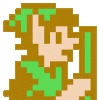what do you do in an rpg once you've done the quests and cleared the dungeons? go buy the next version?
in Oblivion for example, the quests are all canned, hard coded - same every time you play them.
besides that, you can sack dungeons for treasure (money and magic).
but you can also make your own magic items. do the 5 quests to get into the arcane university. goto bravil and buy chameleon spell. make chameleon gear. game over, you're invisible and can still attack!
and gold? use it to recharge magic items, when you don't have soul gems to do so. buy horses to replace the ones constantly getting killed out from under you. thats about it for uses. you can blow it on a house, but there are free beds and free containers that don't respawn everywhere.
in classic D&D, once you got to high level, you could build a castle (requiring about 10 dungeon adventures worth of gold minimum), hired troops (one dungeon adventure's worth of treasure every couple game months), equiped them (this could get really expensive, almost as much as a castle for the best gear), and then could proceed to conquer the world (if you chose to do so).
i'm working on an rpg title now, and i've come to the point of what happens when the player gets to "high level".









